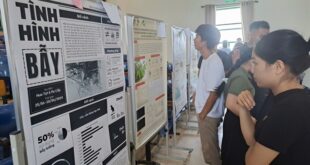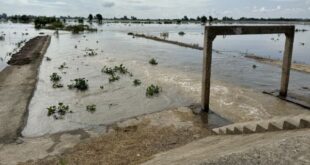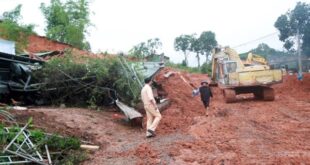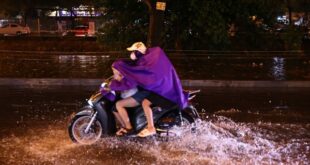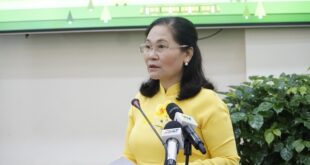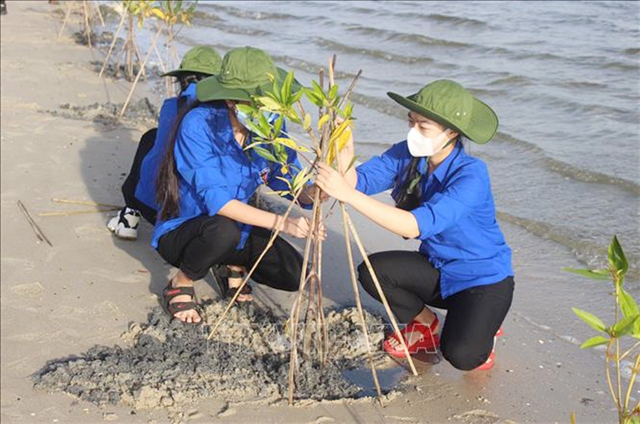
On the context of the ongoing 66th Commission on the Status of Women which opens on March 14, UNDP Resident Representative in Việt Nam Caitlin Wiesen, spoke about women’s role in climate action.
The 66th Commission on the Status of Women focuses on achieving gender equality and the empowerment of all women and girls in the context of climate change, environmental and disaster risk reduction policies and programmes. What do you think about the role women play in climate action?
This year, the International Women’s Day focuses on the theme: “Gender equality today for a sustainable tomorrow”, recognising the contribution of women and girls around the world who are leading the charge on climate change adaptation, mitigation, and response, to build a more sustainable future for all.
Women are hitting a glass ceiling that stops them from advancing to the highest levels of leadership in environmental protection and climate action. Women play a crucial role in climate and environmental sectors and are often leading frontline natural resource management strategies, which makes them well-placed to identify and implement effective and sustainable solutions. But they are still missing from environmental and climate change processes and leadership. UNDP and the University of Pittsburgh’s GEPA report shows that women’s participation in ministries of environmental protection averages 33 per cent globally and parity in decision-making in environmental protection is exceptionally rare.
The impacts of climate change are not gender neutral. Climate change often exacerbates existing inequalities between women and men, the poor and other vulnerable groups. Numerous international climate policies, many that Việt Nam is signatory to, have recognised the dual objectives of reducing gender inequality as a key tool for delivering climate action and building resilience to the impacts of climate change.
It is clear that people who are poor, especially women and ethnic minorities, are most at risk from climate change because they have less ability to adapt to and deal with severe weather events such as storms, floods, and drought. This is clearly seen here in Việt Nam – one of the countries most impacted by climate change – from storms and floods along the coast, to saline intrusion in the Mekong Delta and drought and landslides in the Central Highlands. The Ministry of Natural Resources and Environment (MONRE) is currently leading the formulation of Việt Nam’s National Adaptation Plan (NAP).
UNDP is supporting MONRE to enhance gender mainstreaming in the NAP so that it is more gender-responsive and better able to meet the needs, priorities, and challenges faced by women.
What about your opinion on women’s contrition to climate action in Việt Nam?
In Việt Nam, women hold less than 30 per cent of positions in agricultural and rural development organizations at provincial levels, but according to the FAO, women constitute a key workforce in the agricultural sector especially in rural areas where 63.4 per cent of working women are in agriculture. Women often face barriers in accessing new technologies, gaining knowledge of new climate smart agricultural practices and accessing important Climate Information Services that are needed to make informed decisions on planting and mitigating climate risks. UNDP is working to close the gender gap through providing the conditions and tools for women to make better informed decisions that will lead to increased resilience against impacts of climate change.
For example, in Bình Thuận Province, farmers, especially women, have saved 50 per cent in energy consumption for off-season dragon fruit production. Many cooperatives have experimented with installing LED light bulbs (9w) leading to energy savings compared to using incandescent bulbs (60 – 75w). The installation of LED lights has led to a reduction of GHG emissions from the dragon fruit supply chain. Additionally, these cooperatives have employed several water-saving solutions, such as drip irrigation or low-pressure sprinkler irrigation, leading to better conservation of water resources that are becoming increasingly scarce due to droughts, especially in the south-central coastal provinces. The shifting to green climate friendly agriculture has opened the way for women farmers to sell their dragon fruit in lucrative, green markets such as the EU.
As you know, Việt Nam experiences many storms and extreme weather events and floods. These weather events disproportionately impact women and other vulnerable groups as they have less ability adapt to severe weather events. For example, women and women-headed households especially among poor communities living along the coasts of Việt Nam are subjected to ever more virulent storms and floods and usually live in houses that cannot withstand these severe weather events. Through a Green Climate Fund financed project, UNDP is supporting vulnerable communities to enhance their resilience to storms by providing climate resilient houses. As documented in previous major floods of 2020, these storm resilient houses not only protected women and their families before, during and after storms, but the houses also often become safe havens for other vulnerable members of the community and enabling women to re-start their livelihoods as soon as waters recede. Women have participated in the design and construction of, their houses and one by one are building an empowered frontline of women resilient to climate change. This initiative has made an important contribution with 4,000 storm resilient houses, there is still an estimated 100,000 houses required to meet the needs of vulnerable women and their households on the climate frontlines and should be delivered in the name of climate justice.
As the Commission on the Status of Women takes place, let us galvanise efforts to encourage more women in leadership. Vietnamese women are at the forefront of the battle against COVID-19, climate change, and should be at every table where decisions are made for recovery efforts to ensure a green and inclusive future for all. VnExpress News
- Reduce Hair Loss with PURA D’OR Gold Label Shampoo
- Castor Oil Has Made a “Huge” Difference With Hair and Brow Growth
- Excessive hair loss in men: Signs of illness that cannot be subjective
- Dịch Vụ SEO Website ở Los Angeles, CA: đưa trang web doanh nghiệp bạn lên top Google
- Nails Salon Sierra Madre
 VnExpress News The News Gateway of Vietnam
VnExpress News The News Gateway of Vietnam
